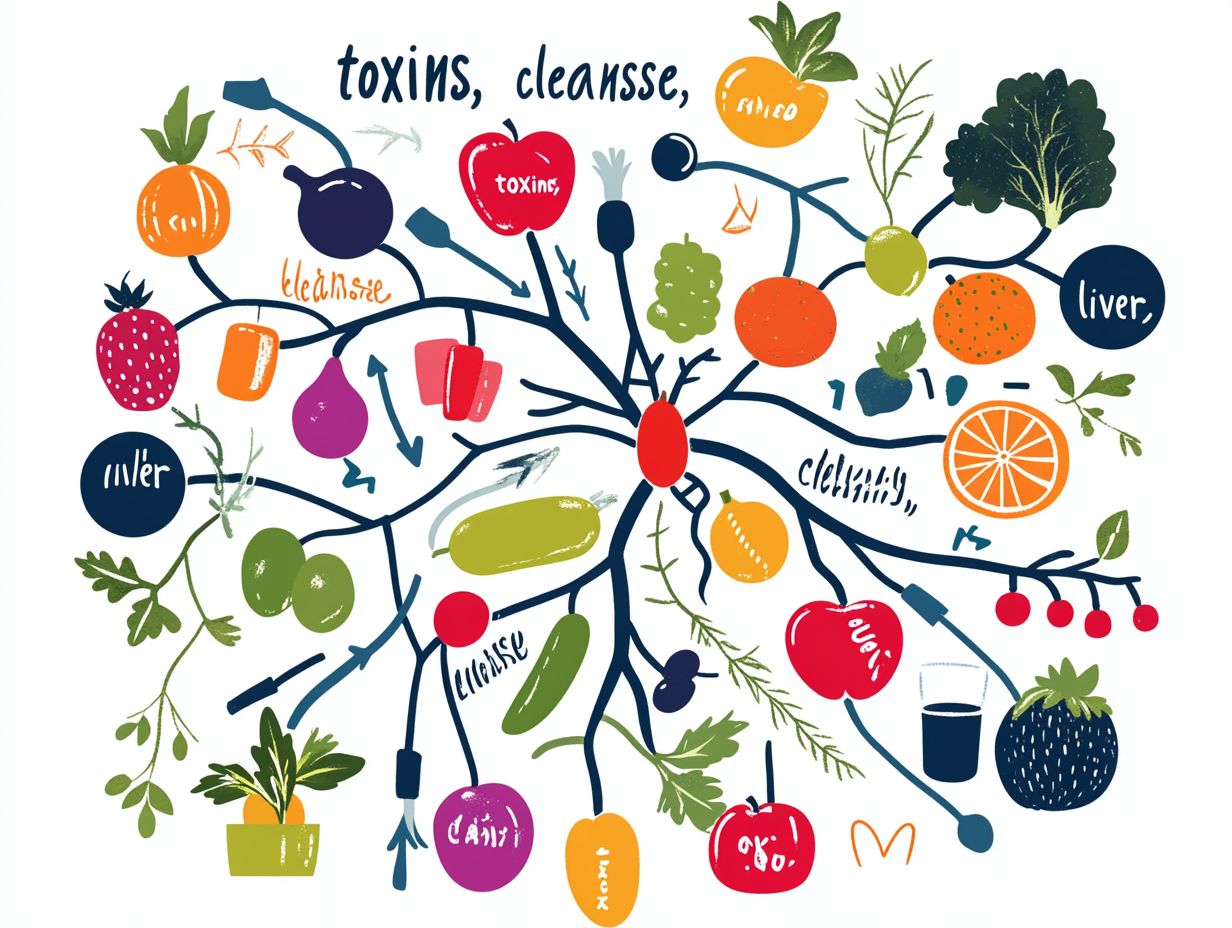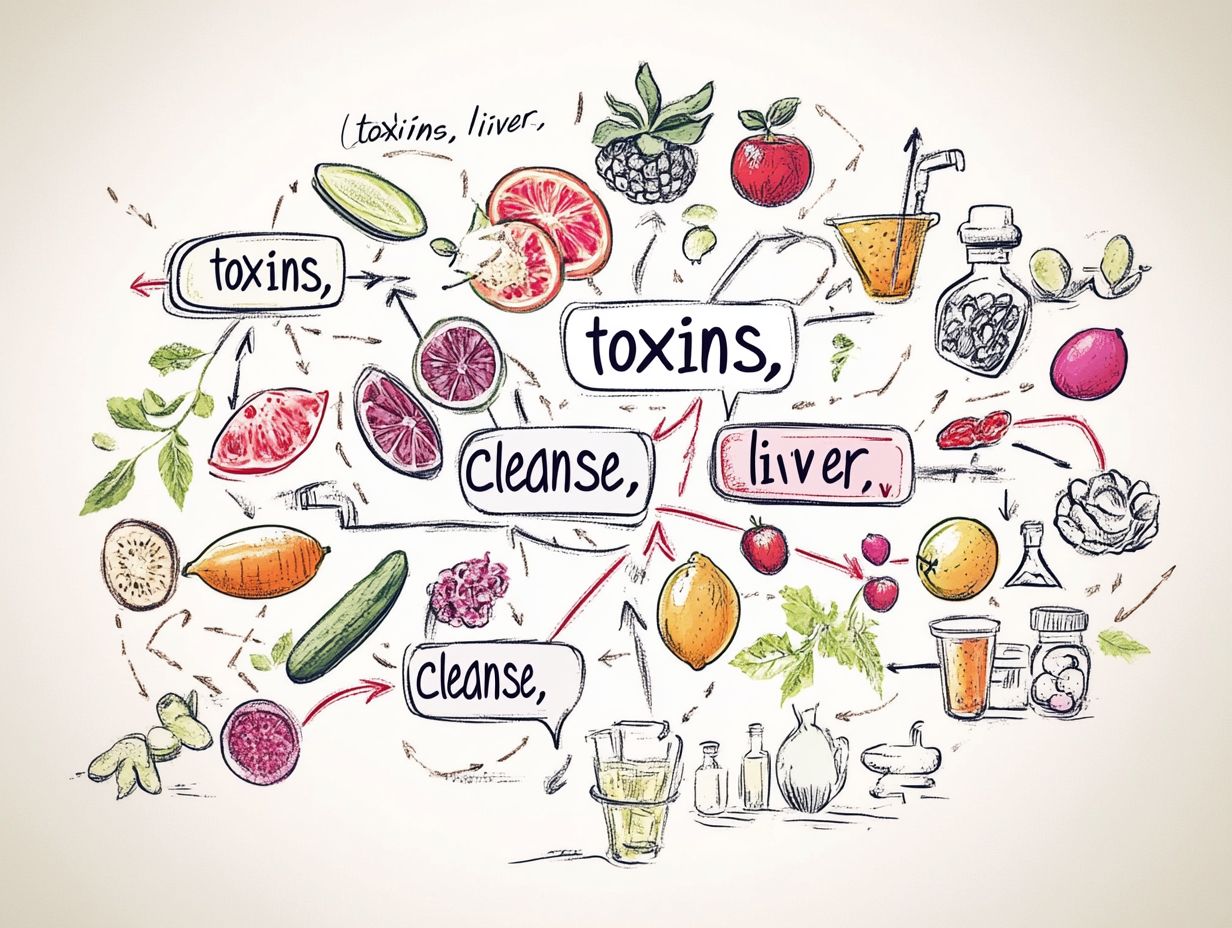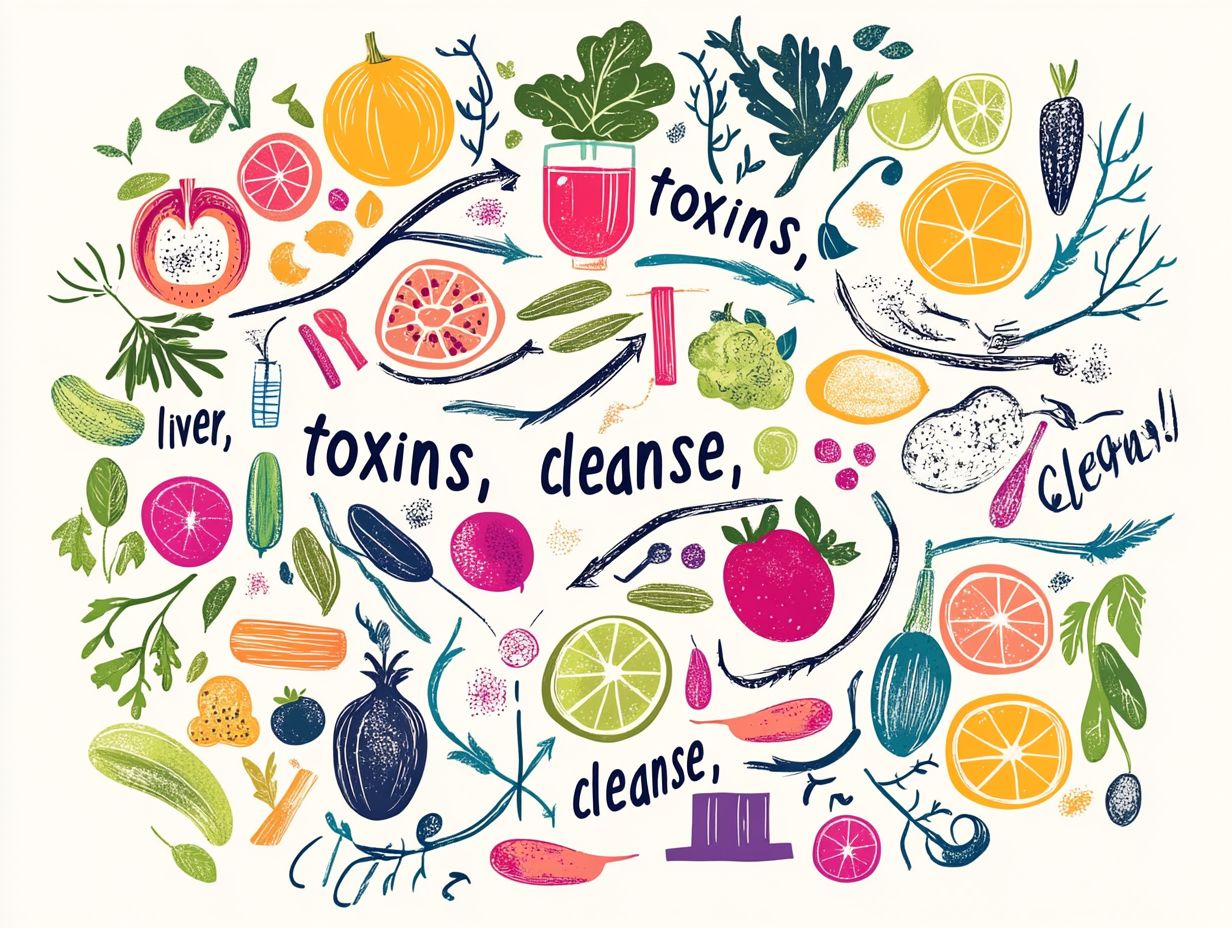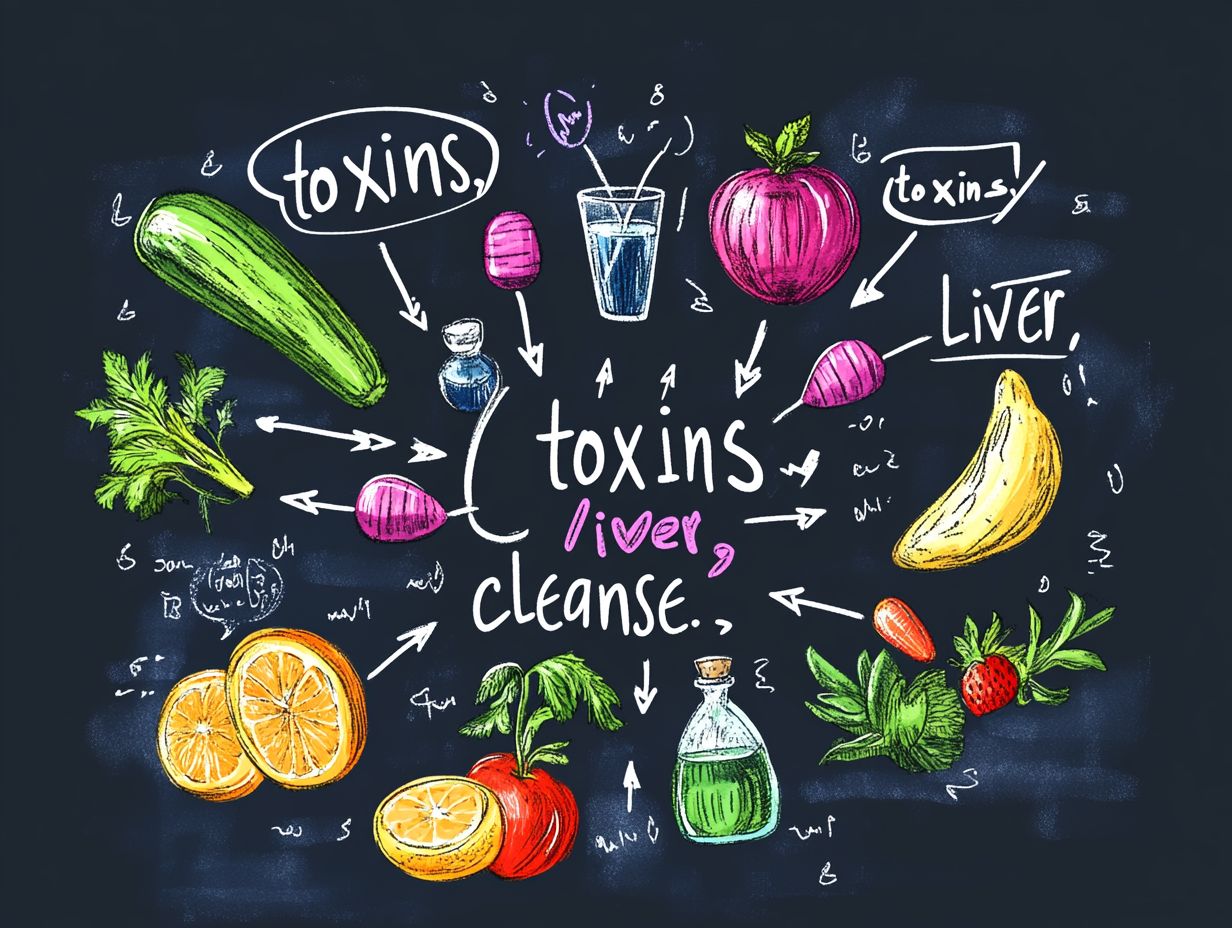Understanding Detoxification: Key Terms Explained
Detoxification includes many myths and misconceptions. What does it truly mean? Understanding the importance of detox and the various detox diets available can be beneficial.
This article delves into the detoxification process, examining various toxic substances that can affect your health. It sheds light on both natural and medically-supervised detox methods, including alcohol detoxification and heavy metal detox.
This article explores the benefits and potential risks of detoxing. It offers practical tips for safely integrating detox practices into your lifestyle, including the importance of support programs. Ready to reclaim your health? Discover how detoxification can boost your vitality today!
Contents
Key Takeaways:

- Detoxification is the natural process of removing harmful substances from the body to improve overall health and well-being, with an emphasis on the natural detox process.
- Toxins, found in common sources such as food, water, and the environment, can negatively impact health. These can be effectively removed through various detox methods, including chelation therapy and dialysis.
- It is important to understand the potential risks and side effects of detoxification, including withdrawal symptoms. Incorporate safe and effective methods into your lifestyle for optimal results.
What is Detoxification?
Detoxification is a thorough process where your body works to eliminate toxic substances and restore its natural balance. This often involves various detox diets tailored to enhance your body’s inherent ability to remove harmful agents.
The intricate operation relies heavily on your organs, particularly the liver and kidneys. These organs perform the natural detox process to maintain homeostasis after exposure to drugs or environmental toxins.
By incorporating both traditional and alternative medicine practices, you can effectively manage drug withdrawal symptoms while pursuing optimal health.
Defining the Process
Detoxification is the systematic elimination of toxins from your body. This process is expertly facilitated by organs like your liver and kidneys, essential for maintaining homeostasis after exposure to harmful substances.
Your liver serves as the body s primary filtration system. It breaks down harmful substances through chemical processes that transform toxins into harmless compounds, including detoxification of alcohol and opioids.
This essential organ also plays a pivotal role in metabolizing drugs and synthesizing proteins, ensuring that you can efficiently process nutrients.
Meanwhile, your kidneys filter waste products from your bloodstream, excreting them through urine while maintaining a delicate electrolyte balance. They play a vital role in the detox process.
Together, these organs engage in a complex biological dance that supports your overall health. By preventing toxin accumulation, they reduce the risk of chronic diseases and help maintain your metabolic equilibrium, which is crucial in managing drug withdrawal.
Toxins and Their Impact on Health
Toxic substances, including heavy metals like cyanide and widely used drugs such as alcohol, opioids, and benzodiazepines, can significantly impact your health. If not effectively detoxified from your body, these substances may lead to withdrawal symptoms and long-term chronic issues that can compromise your well-being.
Common Sources and Effects
Common sources of toxic substances include environmental pollutants, processed foods, and drugs. Each can lead to a range of health effects, from acute withdrawal symptoms to more chronic diseases.
Take heavy metals, for instance lead and mercury are often found in contaminated water and certain seafood. These culprits can contribute to neurological disorders and cognitive decline. Pesticides used in agriculture can also affect your health, leading to long-term issues like hormonal imbalances and respiratory problems.
Substances such as opioids can trigger severe withdrawal symptoms, including anxiety, nausea, and muscle pain. It’s vital to recognize these signs as they indicate your body needs detoxification. Addressing this need can significantly alleviate suffering and help restore balance.
Detoxification is not just a luxury; it’s a necessity for managing the discomfort of withdrawal and tackling the health complications stemming from prolonged toxic exposure, including the effects of heavy metals.
Types of Detoxification

Explore exciting detox methods available to transform your health! You can consider detox diets that emphasize natural approaches, such as water fasting and Gerson therapy. You may also explore medically-supervised detox programs designed with structured therapies to effectively and safely eliminate harmful substances from your body.
Natural vs. Medically-Supervised Methods
Natural detox methods often encompass detox diets filled with nutrient-rich foods. In contrast, medically-supervised detox programs offer clinical oversight and tailored therapies using natural remedies to guide you safely through the detoxification process.
The choice between these methods is pivotal. Natural approaches typically highlight the use of whole foods, herbal teas, and hydration techniques, promoting a gradual release of toxins. Popular detox diets like the Juice Cleanse or the Master Cleanse encourage nutrient intake while restricting processed foods.
Conversely, medically-supervised detox programs often incorporate medications prescribed by doctors or intravenous therapies under professional supervision. These specifically address severe withdrawal symptoms associated with drug detoxification and provide a controlled environment.
Each method has its own effectiveness and safety considerations. Natural detox methods are generally safer but may be less effective in acute situations, while medical detox can yield faster results but comes with certain risks associated with medical interventions.
Benefits of Detoxification
Detoxification can dramatically improve your health and energy levels! It helps eliminate accumulated toxins, such as heavy metals, while also supporting vital processes like alcohol detoxification and drug detoxification.
This comprehensive approach elevates your quality of life, allowing you to feel revitalized and more in tune with your body.
Improving Overall Health and Well-being
Improving your overall health and well-being through detoxification is within your reach by embracing nutrient-rich foods that complement your body s natural detox processes.
Incorporating a vibrant array of fruits and vegetables including leafy greens, succulent berries, and robust cruciferous options like broccoli and kale can provide significant support for your detoxification efforts. These foods are rich in essential vitamins, minerals, and antioxidants, enhancing liver function and aiding in the elimination of harmful toxins.
Embracing a lifestyle that prioritizes regular hydration, restorative sleep, and mindfulness practices can further amplify your body s detoxifying capabilities. Exploring diets such as the Mediterranean or plant-based options can also be beneficial as they focus on wholesome ingredients that promote overall health and effectively support the detox process.
Potential Risks and Side Effects
Detoxification offers a wealth of health benefits, but it’s crucial to acknowledge the potential risks and side effects that can accompany this process, including those linked to withdrawal symptoms.
You might experience detox symptoms during acute withdrawal, as well as throughout the ongoing protracted withdrawal periods. These can be managed through support programs. Being aware of these challenges allows you to navigate the journey with greater insight and preparedness.
Understanding and Managing Detox Symptoms

Understanding and managing detox symptoms is vital during detoxification, especially during acute withdrawal, when symptoms can be particularly intense and challenging.
This stage often presents a range of physical and psychological hurdles. The challenges of withdrawal syndrome make it essential to develop effective strategies to alleviate discomfort. Being aware of withdrawal syndrome empowers you and directs you toward appropriate support programs that can provide valuable resources.
Making lifestyle adjustments, such as maintaining a balanced diet and engaging in regular exercise, plays a crucial role in easing your detox journey. Incorporating mindfulness practices is also beneficial. Connecting with support groups can create a sense of community and understanding during this transformative process, helping you feel less isolated as you navigate through your symptoms.
Exciting Ways to Embrace Detoxification in Your Life!
Incorporating detoxification into your lifestyle requires making dietary adjustments that enhance detox support. Engaging with programs designed to guide you through your detox journey, including First Nation and Inuit resources, is essential.
Embracing these changes can transform your well-being and energize your life!
Tips for Safe and Effective Detoxing
For a safe and effective detox, consider embracing gradual lifestyle changes. Seek detox support that offers tailored guidance to meet your individual needs, particularly if you are managing substance-related challenges.
Taking small, manageable steps will enable your body to adjust without overwhelming its systems. It’s also wise to consult healthcare professionals for personalized advice, ensuring that your changes align perfectly with your health profile.
Throughout this journey, monitoring your physical and mental state is crucial as it allows for timely adjustments and reinforces the importance of accountability. By adopting a holistic approach encompassing nutrition, hydration, and mindfulness, you can significantly enhance your detox experience, promoting not only physical well-being but also emotional balance, ultimately leading to a more enduring transformation.
Frequently Asked Questions
What is detoxification?
Detoxification means getting rid of harmful substances from your body.
What are toxins?

Toxins are any harmful substances that can be found in the environment or in the food we consume, such as pollutants, chemicals, and processed ingredients.
Why is detoxification important?
Detoxification is important because it helps our body eliminate toxins and maintain optimal health. Without regular detoxification, toxins can build up and lead to various health issues.
What are some common detoxification methods?
Common detoxification methods include fasting, juice cleanses, and avoiding processed foods. Exercise, saunas, and colon cleansing are also popular methods.
What is a toxin overload?
A toxin overload occurs when our body is exposed to more toxins than it can effectively eliminate. This can lead to symptoms such as fatigue, headaches, and skin problems.
Start your detox journey today for a healthier you!
Can everyone benefit from detox?
Yes, detox can help everyone because we all face toxins in our daily lives.
Before starting any detox program, please consult with a healthcare professional, especially if you have health concerns.






